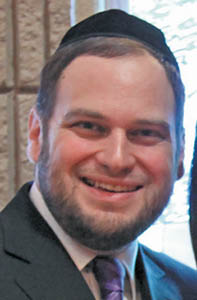
It was a miracle to me, although many would not agree. Three years ago I traveled to Israel with my daughter Tziporah for my nephew’s bar mitzvah. With so much to see together in a short period of time, we had to make some difficult choices. While visiting some very serious places as we all do in Israel, we decided to do something that we thought would be fun and interesting. We were told that the Blind Museum in Holon was an amazing experience. When we arrived, we were given a brief introduction in order to prepare us for the museum tour. This museum is not like any other. There is nothing to see. Visitors have to use their other senses in order to grasp the experience. The museum itself is pitch black to the point where you cannot see anyone or anything near you. The objective is for people to feel what it is like to live life as a blind person. There could not have been a more bonding experience for a father and daughter than having to hold on to each other in order to avoid falling or getting lost. As the tour came to its end, we were told to feel for a rail and follow it. Eventually we walked into a room that was dimly lit, leading us back to normal light. The miracle for me that day was that I was able to see. A miracle indeed.
Dr. Brene Brown, in her book “Daring Greatly,” speaks about the fixation many of us have in this generation to be extraordinary and the fear that we have of being ordinary. She suggests that many of us go through life pursuing the extraordinary and as a result end up missing out on the incredible opportunity and achievement of being ordinary. I believe the same is true when it comes to miracles. Chanukah is the time in which we speak about the miracles that Hashem performed for our ancestors in the story of Chanukah and throughout our history. We may fall short, however, in recognizing the ordinary miracles that Hashem performs for us on a regular basis, such as the ability to see, hear and smell. We expect these parts of us to be working and don’t necessarily view its functioning as a miracle until the time, chas v’shalom, when a problem arises.
The Bnei Yissaschar suggests that there is more to the dreidel than meets the eye. He compares what seems to be the two devices used by children to express and celebrate the chagim of Chanukah and Purim. On Chanukah, the dreidel is played with and it commemorates the secret learning that took place during the period after the Greeks had banned Torah learning. When those who were learning in secret saw the Greek authorities approaching, they would hide their sefer and play with their dreidels. On Purim, children use a grogger to stomp out the name of Haman harasha. One of the distinctions between a dreidel and grogger is how it is held. A dreidel is used by holding it from the top, but a grogger is used by holding it from the bottom.
The miracles of Chanukah went against nature. The miracle of the oil lasting for eight days, as well as the miracle of the few defeating the many, went against the flow of nature and what was expected. It was Hashem who engaged in the story in a very open way, thus the dreidel is held from the top. The miracle of Purim, however, appeared to flow in the natural progression of the rise and fall of political figures. Hashem’s miracle was hidden, thus the grogger is held from the bottom. A common theme to both chagim is that Hashem is always with us; at certain moments His influence is clear, whereas at other times we need to look very closely with our eyes. While we celebrate extraordinarily clear and obvious miracles in a very open way, we must also recognize the miracles that we are presented with in our everyday lives. We thank Hashem in our Shemoneh Esrei three times daily in the tefillah of Modim. There, we recognize the miracles that may seem to be ordinary and are grateful for them. Chanukah reminds us that not every miracle needs to be extraordinary, and that we are able to see Hashem’s influence in our lives with our own eyes each and every day.
By Rabbi Eliezer Zwickler
Rabbi Eliezer Zwickler is rabbi of Congregation AABJ&D in West Orange, New Jersey, and is a licensed clinical social worker in private practice. Rabbi Zwickler can be reached at [email protected].








